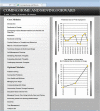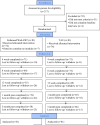Web-Delivered CBT Reduces Heavy Drinking in OEF-OIF Veterans in Primary Care With Symptomatic Substance Use and PTSD
- PMID: 28270335
- PMCID: PMC5345259
- DOI: 10.1016/j.beth.2016.09.001
Web-Delivered CBT Reduces Heavy Drinking in OEF-OIF Veterans in Primary Care With Symptomatic Substance Use and PTSD
Abstract
Veterans from conflicts such as the wars in Iraq and Afghanistan commonly return with behavioral health problems, including posttraumatic stress disorder (PTSD) and hazardous or harmful substance use. Unfortunately, many veterans experience significant barriers to receiving evidence-based treatment, including poor treatment motivation, concerns about stigma, and lack of access to appropriate care. To address this need, the current study developed and evaluated a web-based self-management intervention based on cognitive behavioral therapy (CBT), targeting PTSD symptoms and hazardous substance use in a group of symptomatic combat veterans enrolled in VA primary care. Veterans with PTSD/subthreshold PTSD and hazardous substance use were randomized to primary care treatment as usual (TAU; n = 81) or to TAU plus a web-based CBT intervention called Thinking Forward (n = 81). Thinking Forward consisted of 24 sections (approximately 20 minutes each), accessible over 12 weeks. Participants completed baseline and 4-, 8-, 12-, 16-, and 24-week follow-up assessments. Three primary outcomes of PTSD, alcohol and other drug use, and quality of life were examined. Significant treatment effects were found for heavy drinking, but not for PTSD or quality of life. The effect of the intervention on heavy drinking was mediated by intervening increases in coping, social support, self-efficacy, and hope for the future. These results demonstrate the promise of a web-based, self-management intervention for difficult-to-engage OEF/OIF veterans with behavioral health and substance use concerns.
Keywords: CBT; PTSD; alcohol; technology; veterans.
Copyright © 2016. Published by Elsevier Ltd.
Figures
References
-
- Aickin M. A program for balancing the allocation of subjects to treatment in a clinical trial. Computers and Biomedical Research. 1982;15(6):519–524. - PubMed
-
- Babor TF, Higgins-Biddle JC, Saunders JB, Monteiro MG. Audit. The Alcohol Use Disorders Identification Test (AUDIT): Guidelines for use in primary care. 2001
-
- Back SE, Brady KT, Jaanimagi U, Jackson JL. Cocaine dependence and PTSD: a pilot study of symptom interplay and treatment preferences. Addictive Behaviors. 2006;31(2):351–354. doi: 10.1016/j.addbeh.2005.05.008. - PubMed
-
- Blake DD, Weathers FW, Nagy LM, Kaloupek DG, Gusman FD, Charney DS, Keane TM. The development of a Clinician-Administered PTSD Scale. Journal of Traumatic Stress. 1995;8(1):75–90. - PubMed
Publication types
MeSH terms
Grants and funding
LinkOut - more resources
Full Text Sources
Other Literature Sources
Medical




